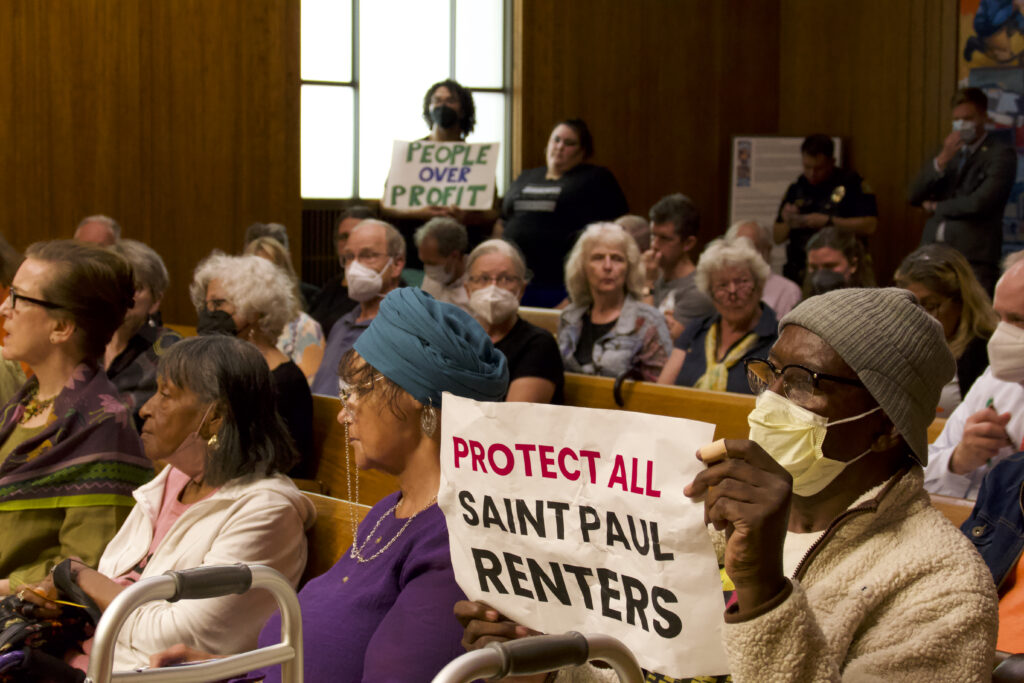Renters and activists urged the St. Paul City Council not to exempt affordable housing from the city’s rent control policy during a public hearing on Aug. 24, 2022. Photo by Max Nesterak/minnesotadigest.com.
Renters, activists and developers rehashed the heated debate over St. Paul’s rent control ordinance during more than two hours of public testimony in a packed City Council meeting on Wednesday.
On one side are developers, landlords and union construction workers who called on city leaders to exempt new construction, saying the ordinance that took effect four months ago has scared off investors and will exacerbate the city’s shortage of affordable housing.
On the other side are renters, faith leaders and housing activists who called on the city to resist making significant changes to the ordinance, saying renters need the protection from rent hikes now.
The seven-member St. Paul City Council held the public hearing as they consider a sweeping package of changes to the rent control ordinance, which was drafted by activists and approved by voters despite opposition from a majority of council members.
St. Paul is the only city in the Midwest with rent control, and it is one of the most stringent policies in the country, capping annual rent increases at 3% on all units across the city.
Council Member Chris Tolbert introduced a package of amendments to the ordinance earlier this month in an opening bid to address the numerous issues that have arisen since it took effect May 1.
His proposal includes exempting new construction and affordable housing, allowing landlords to “bank” rent increases until a tenant moves out and allowing landlords to spread out larger rent increases to pay for major improvements.
But renters pushed back on the proposals to relax the policy, saying landlords are already exploiting loopholes by adding new charges for utilities or jacking up rents through the city’s exemption process. Landlords can “self-certify” that increases beyond 3% are necessary for a “reasonable return on investment,” and the city automatically approves them up to 8%, subject to an audit.
Stephanie Ericsson Hinton told the council on Wednesday she mostly lives on Social Security and has to spend 75% of her income on rent after her landlord — affordable housing giant Dominium — raised everyone’s rent by 8% in St. Paul by claiming a reasonable rate of return exemption.
“We elected you to protect us,” Hinton told the council. “There’s a word for people who take advantage of chaotic situations to steal. Looter. Dominium is looting us.”
Under Tolbert’s proposal, Dominium’s subsidized properties would be exempt completely from the rent control ordinance.
Council Member Mitra Jalali, who supported the rent control ordinance, criticized the proposal as too broad and offered an amendment that would remove the affordable housing exemption to Tolbert’s plan.
Jalali put forward a proposal that would only exempt new construction going forward for a period of 15 years, in line with the recommendation by the 41-member rent control task force convened by Mayor Melvin Carter.
The council will make a decision on what new construction to exempt when they vote on all the amendments at their next meeting on Sept. 7. Any changes approved will take effect Jan. 1.
Before the ordinance even took effect, developers announced they were halting projects, and Carter called on the council to exempt new construction from the ordinance as quickly as possible.
Developers asked the City Council to expand the exemption to 30 years to ensure they can find investors to restart the projects put on ice in the wake of the ordinance passing.
City and federal data tell contradicting stories on what has happened to construction since the ordinance was passed.
According to data from the U.S. Department of Housing and Urban Development, new development cratered in the first half of 2022. The city approved permits for just 288 new units in multifamily housing in 2022 — compared to 1,587 during the same time period last year.
New data released by the city of St. Paul’s Department of Safety and Inspections, however, show new permit applications soaring. According to the city’s data, the number of permit applications for new housing — including single family homes, duplexes and large apartment buildings — was 915 in the first half of 2022, up from 580 during the same period last year. Only 2020 showed more permit applications — 1,068 in the first six months — over the past five years.
Angie Wiese, the city department’s director, could not explain the difference between the two data sets, but said the city’s data shows there continues to be strong interest in building in St. Paul.
Tony Barranco, a vice president with the Minneapolis-based Ryan Companies, said the city’s data doesn’t match what developers are seeing on the ground.
Ryan Companies halted a slew of apartment buildings planned for the massive redevelopment project at the old Ford plant site called Highland Bridge. He said investors have fled the city, which has stymied building.
“We can’t get financing,” Barranco said. “The reality is there is no money for housing with this ordinance in place.”
Tolbert’s proposal also gives landlords the option to “bank” rent increases until after a tenant moves out, so as to discourage landlords from raising rents 3% every year. Once a tenant moves out, landlords can charge what the rent would have been had they raised rent 3% every year.
Council Member Jane Prince put forward an amendment that would allow for full “vacancy decontrol,” meaning landlords could increase the rent as much as the market allows once a tenant moves out.
Jalali also offered amendments that would require tenants to be notified of their landlords seeking an exemption to the 3% annual cap and requiring landlords to pay relocation assistance if they were found to have unjustly forced out tenants.
The post Renters and developers press St. Paul council for opposing changes to rent control policy appeared first on minnesotadigest.com.
